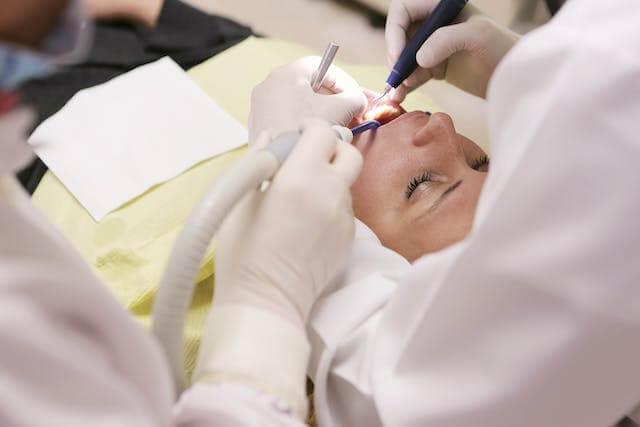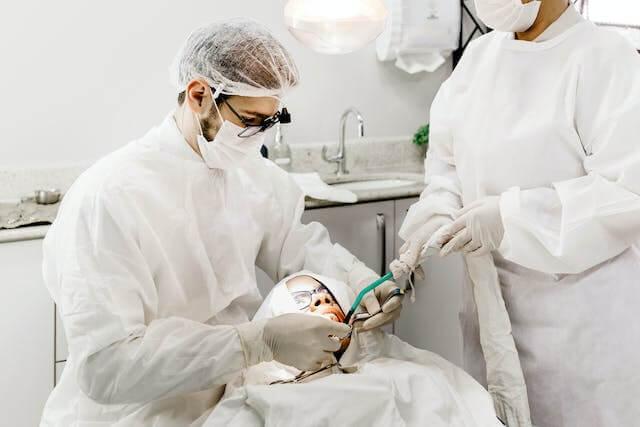Grinding teeth, a condition known as bruxism, can be both uncomfortable and damaging to your oral health. If you wake up with a sore jaw or headaches or notice that your teeth are wearing down, you may be wondering how to fix grinded teeth. Within this in-depth guide, we will delve into the origins of teeth grinding, the potential repercussions, and, most significantly, an array of methods and therapies to tackle this concern effectively. Bruxism, a prevalent dental issue, entails the involuntary clenching and grinding of teeth. It primarily manifests during sleep, rendering it difficult to manage consciously. This condition can be categorized into two main types: Teeth grinding, clinically known as bruxism, is a complex condition with multiple underlying causes. Understanding these causes is essential for effectively addressing this common dental issue. Here's a more detailed exploration of the factors contributing to bruxism: Perhaps one of the most widely recognized triggers for teeth grinding is heightened stress and anxiety. Bruxism often manifests as a subconscious coping mechanism, with individuals clenching or grinding their teeth when faced with emotional strain or pressure. The tension from daily life, work-related stress, or personal worries can find an outlet in the form of teeth grinding. An improper bite alignment can significantly contribute to teeth grinding. When teeth do not fit together correctly, the jaw may struggle to find a comfortable resting position. As a result, the body may engage in grinding as it seeks relief from the discomfort caused by misalignment. Sleep disorders, particularly conditions like sleep apnea, can be associated with bruxism. Sleep apnea involves brief interruptions in breathing during sleep, which can trigger the body's response by clenching or grinding teeth. This is a protective mechanism the body employs to reopen the airway. Certain lifestyle choices can exacerbate teeth grinding. Heavy alcohol consumption, tobacco usage, and the recreational use of drugs have been associated with an elevated susceptibility to bruxism. These substances can affect the central nervous system and disrupt the normal functioning of the muscles involved in chewing. Some medications, especially those prescribed for mental health issues such as anxiety and depression, may list bruxism as a potential side effect. The interaction between these drugs and the central nervous system can lead to involuntary teeth grinding during sleep or wakefulness. Bruxism is more commonly observed in children, but it can persist into adulthood for some individuals. It's essential to recognize that age is a factor, and teeth grinding may evolve or change over time. Understanding the age-related aspects of bruxism can help tailor treatments for different age groups effectively. If not addressed promptly, teeth grinding can result in a range of oral health problems and discomfort. Common outcomes of bruxism encompass: Addressing grinded teeth involves a multi-faceted approach, often tailored to the individual's specific circumstances and the severity of the condition. Here's an in-depth exploration of the strategies and treatments available to fix grinded teeth: One of the most common and effective ways to address teeth grinding is by wearing a custom-fitted mouthguard or splint. These oral appliances create a barrier between the upper and lower teeth, preventing them from grinding against each other. Mouthguards are typically recommended for nighttime use, as sleep bruxism is more prevalent. Over-the-counter options are available, but a custom-fitted device from a dentist offers the best protection. How to fix grinded teeth: Visit your dentist to have a custom mouthguard or splint made. Wear it regularly to protect your teeth from further damage. If your teeth grinding is triggered by stress and anxiety, addressing these emotional factors can prove to be a valuable solution. Employing practices such as mindfulness meditation, yoga sessions, regular physical activity, and therapeutic interventions can effectively alleviate tension and reduce the occurrence of bruxism. How to fix grinded teeth: Practice stress management techniques regularly to reduce the triggers for teeth grinding. If an improper bite alignment is identified as the root cause of your teeth grinding, orthodontic intervention may be advised. Orthodontics can correct the misalignment of your teeth and alleviate the grinding. How to fix grinded teeth: Consult an orthodontist to discuss treatment options and determine if braces or other orthodontic appliances are necessary. For those grappling with bruxism linked to stress or anxiety, engaging in behavioral intervention can prove highly advantageous. This therapeutic approach assists in recognizing and resolving the fundamental emotional triggers contributing to teeth grinding. How to fix grinded teeth: Consider seeking therapy to learn effective coping mechanisms and reduce bruxism. In some cases, dentists may prescribe muscle relaxants or medications to manage the symptoms of bruxism. These drugs can help relax the jaw muscles and reduce grinding. How to fix grinded teeth: Consult your dentist or healthcare provider to discuss medication options if necessary. If lifestyle factors, such as alcohol consumption or drug use, contribute to your teeth grinding, consider making healthier choices. Reducing or eliminating these factors can lead to a decrease in bruxism. How to fix grinded teeth: Make conscious efforts to adopt a healthier lifestyle by reducing alcohol and drug use. Regular dental check-ups are essential for monitoring the condition of your teeth and identifying any signs of grinding early on. Your dentist can provide guidance and recommend appropriate treatments as needed. How to fix grinded teeth: Visit your dentist for routine check-ups, especially if you suspect or have a history of teeth grinding. At ARC Dental Health, we are committed to enhancing your oral health and providing effective solutions for bruxism, the common dental concern of teeth grinding. Our dedicated team specializes in helping individuals like you regain control over their oral health and put an end to the discomfort caused by grinded teeth. Our commitment to your oral health doesn't end with treatment. We emphasize the importance of regular dental check-ups, where our experienced dentists monitor your progress, offer guidance, and ensure that your bruxism management plan is effective and sustainable. With ARC Dental Health as your partner in addressing grinded teeth, you can trust that your journey to fixing bruxism will be comprehensive, personalized, and focused on your long-term well-being. Contact us today to take the first step towards a healthier, pain-free smile and the peace of mind that comes with knowing your oral health is in expert hands. Teeth grinding can be a troublesome condition, but it is not one that you have to endure indefinitely. By understanding the causes, consequences, and effective treatments for bruxism, you can take proactive steps to protect your oral health. Whether it's wearing a custom-fitted mouthguard, managing stress, seeking orthodontic treatment, or making lifestyle changes, there are various ways to address teeth grinding and fix grinded teeth. Remember to consult with your dentist or healthcare provider to determine the most suitable approach for your specific needs. Take action today to safeguard your smile and overall well-being.
Understanding Teeth Grinding
Causes of Teeth Grinding
Stress and Anxiety
Malocclusion (Misaligned Bite)
Sleep Disorders
Lifestyle Factors
Medications
Age
Consequences of Teeth Grinding
How to Fix Grinded Teeth

Mouthguards and Splints:
Stress Management
Orthodontic Treatment
Behavioral Intervention
Medication
Lifestyle Changes
Regular Dental Check-ups
ARC Dental Health - Your Partner in Bruxism Solutions
Conclusion
